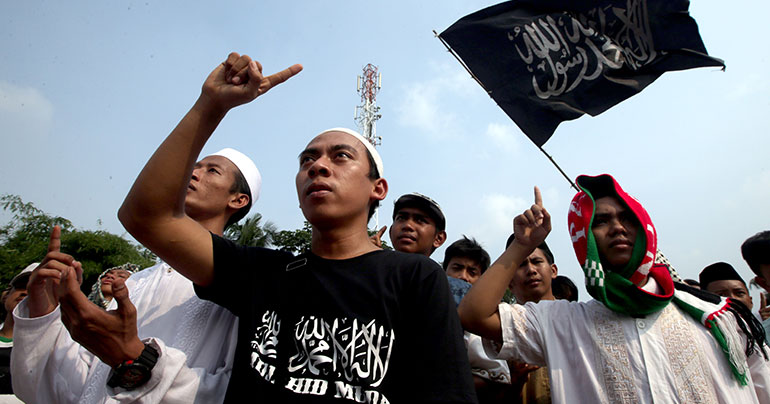Islamic cleric Rizieq Shihab who had earlier demanded ‘Sharia rule’ returned from self-exile in Saudi Arabia last month and had declared plans for a “moral revolution” in Indonesia. However, his return has been marked by riots and incidents of violent clashes with the police. Clashes between his supporters and police have left six people dead who the police say were shot in self defence. Shihab is the founder of the Islamic Defenders Front (FPI) which aims to Islamise the politics of the country, bring ‘Sharia Law’ and also cleanse Indonesia of non-Islamic influences.
Jakarta’s police chief Fadil Imran said that supporters of Rizieq Shihab clashed with the police as they tried to reach a police station where he was to be questioned. Shihab was due to be questioned on Monday for violating COVID-19 restrictions last month when tens of thousands of his followers gathered at his home to attend the wedding of his daughter.
The police are also reportedly investigating him for violations of health protocols during the pandemic after large crowds turned out to celebrate his return to Indonesia from Saudi Arabia. The police chief said that the police were forced to defend themselves when supporters of Rizieq Shihab attacked them at a toll road about 50km east of the capital Jakarta.
Shihab was charged by the police in 2017 in connection with a pornography chat case and for insulting the Pancasila state ideology. However, he fled Indonesia soon after the charges were filed but he claims that he arrived at Mecca for an umrah (minor pilgrimage). He did not return to Indonesia and was allegedly trying to influence the government to drop charges against him while staying in Saudi Arabia.
In 2018, the Indonesian police dropped all charges against him due to ‘lack of concrete evidence’.

The Islamic Defenders Front in the past has indulged in vandalising nightspots, moral policing on streets, stoning of Western embassies and attacking religious minorities on one pretext or the other. The front wants Sharia law to be applicable to all of Indonesia.
The group which has significant support among the majority Muslim community in Indonesia, was behind the massive street protests in 2016 and 2017 against the governor of Jakarta. Jakarta’s former governor, Basuki Tjahaja Purnama, who is a Christian was accused of blasphemy in 2016. Protests against Purnama were led by Rizieq and FPI which soon turned into a mass uprising of Muslims in the country demanding Sharia Law. Many minorities including Hindus and Christians were attacked and their homes burnt during these protests. Several minority run businesses were also ransacked for many months. Religious minorities in Indonesia have been living in fear since then.
The 2016 Muslim uprising was the biggest threat faced by President Joko Widodo’s (Jokowi) government. In order to pacify the Muslims, Jokowi chose a senior Islamic cleric, Ma’ruf Amin, as his vice presidential running mate in 2019. He further appointed Prabowo Subianto who had the backing of the Islamist groups as defence minister.
Rizieq’s self-imposed exile ensured that FPI was kept at bay for the last few years. However, his return might pose issues to Jokowi again and the incidents of 7 December indicate the same. Indonesia, which is already grappling with rising cases of COVID-19, might find it difficult to contain Rizieq and his supporters. FPI is also seen as a big influence on the regional polls which were held on Wednesday.
With Indonesia already drawing global flak for its poor handling of COVID-19 pandemic, it’s reputation will be on the line if it allows hardliners like Rizieq to get a foothold in the politics of the country and make life difficult for its minorities.
